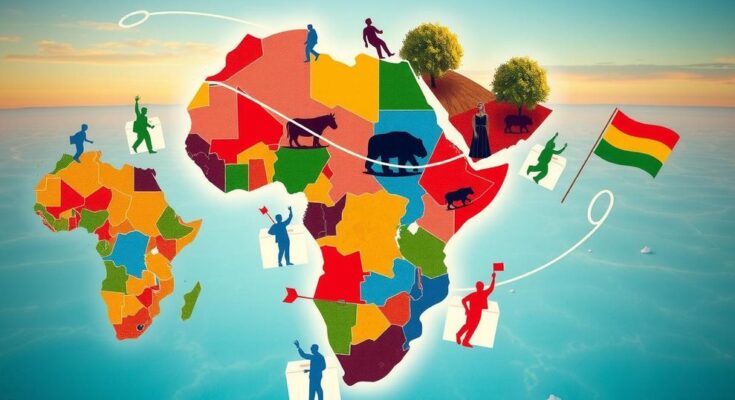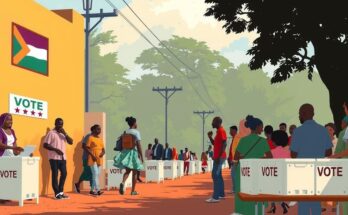Africa is set for a significant electoral year in 2025, featuring nine presidential, seven legislative, two senatorial, two municipal elections, and two referendums across various nations. Key elections include Gabon, Burundi, Malawi, Seychelles, Guinea, Cameroon, Ivory Coast, Tanzania, Guinea-Bissau, the Central African Republic, Togo, and Comoros, each holding pivotal political contests that will shape the continent’s future.
The African continent is anticipating a busy electoral year in 2025, with a plethora of elections scheduled that will significantly influence political landscapes across various nations. At least nine presidential elections, along with seven legislative, two senatorial, two municipal elections, and two referendums, are on the agenda.
Among the notable elections, Gabon will hold presidential elections on April 12, following a recent constitutional referendum. This follows a military coup in August 2023, with Gen. Brice Oligui Nguema expected to seek election as the transitional leader in an electorate of approximately 2.4 million.
Burundi is set to conduct legislative elections on June 5, followed by senatorial elections on July 23. The ruling party holds the majority in the 123-seat National Assembly, and President Evariste Ndayishimiye has been in power since 2020.
Malawi will organize presidential and legislative elections on September 16. Approximately 2.5 million out of 21.7 million eligible voters are registered to vote, with President Lazarus Chakwera aiming to secure reelection. The National Assembly consists of 193 seats.
Seychelles plans to hold combined presidential and legislative elections on September 27, with President Wavel Ramkalawan also seeking reelection. The island nation has 56,730 registered voters, reflecting its small yet engaged electorate.
In Guinea, transitional President Mamadi Doumbouya announced a return to constitutional order by late 2025 through a referendum and general elections. Following a coup in 2021, he laid out a phased electoral process commencing with municipal elections.
Cameroon will hold presidential elections in October, with long-serving President Paul Biya announcing his candidacy amidst a field that includes ten other challengers. The nation has around 30 million residents, with millions registered to vote.
Ivory Coast is scheduled for a presidential election in October, with President Alassane Ouattara anticipated to seek another term. The diverse political landscape may include other notable candidates including former Prime Minister Pascal Affi N’Guessan.
Tanzania will join the list of nations holding presidential elections in October, under the leadership of President Samia Suluhu Hassan, who took office in 2021. She is expected to pursue reelection.
Guinea-Bissau aims for simultaneous presidential and legislative elections between October 23 and November 25, with President Umaro Sissoco Embalo as the current leader. The elections reflect a critical political moment for around two million citizens.
Lastly, the Central African Republic will conduct its presidential elections in December, with President Faustin-Archange Touadera potentially seeking a third term. The political stakes are particularly high as the country navigates its leadership for over five million residents.
Togo plans to hold its inaugural senatorial elections on February 15, 2025, marking its transition from a presidential toward a parliamentary system. The newly formed Senate will be partially elected and appointed.
Comoros has already commenced its electoral activities with legislative elections held on January 12. The ruling party’s stronghold was reaffirmed, though some constituencies will undergo reruns due to election challenges.
The year 2025 is poised to be instrumental for the African political sphere, with numerous nations gearing up for significant elections. The diversity of political contexts and histories across the continent underscores the importance of these elections. In the wake of events like coups and constitutional changes, the forthcoming elections reflect both stability and transition in various countries, making the year pivotal for both the electorate and the political landscape.
In summary, 2025 promises to be a critical year for democracy in African nations, with a multitude of major elections scheduled. From Gabon’s presidential election to Togo’s new senatorial system, the outcomes of these political contests are likely to shape the future governance and democratic processes across the continent. As these nations approach their respective electoral dates, the global community watches closely, anticipating potential shifts in leadership and policy direction.
Original Source: www.aa.com.tr




